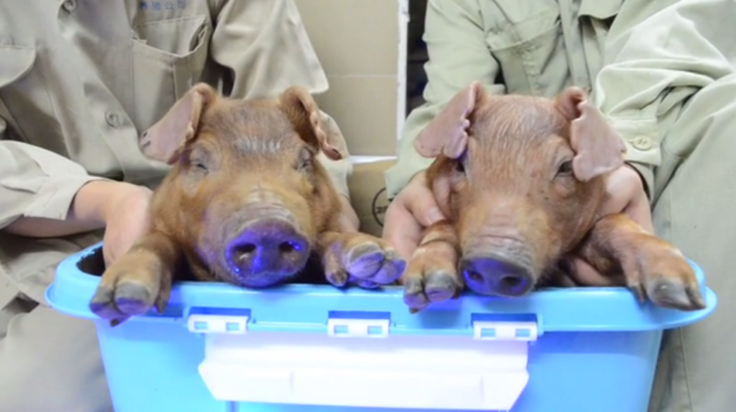‘Glow-In-The-Dark’ Piglets Born In China With Fluorescent Protein From Jellyfish DNA [PHOTO, VIDEO]

A group of pigs in China were born with a greenish glow.
Using a technique developed by reproductive scientists from the University of Hawaii, 10 transgenic piglets have been born in China. Under a black light, the pigs have a greenish tint.
“It’s just a marker to show that we can take a gene that was not originally present in the animal and now exists in it,” Stefan Moisyadi, a veteran bioscientist from the University of Hawaii, said in a statement.
Researchers from South China Agricultural University were able to create the “glow-in-the-dark” piglets by injecting their embryos with a fluorescent protein from jellyfish DNA. According to Moisyadi, the pigs will have the same lifespan as their nonfluorescent counterparts.
“The green is only a marker to show that it’s working easily,” he said.
The findings, published in the Biology of Reproduction journal, may help create less costly and more efficient medicines. "[For] patients who suffer from hemophilia and they need the blood-clotting enzymes in their blood, we can make those enzymes a lot cheaper in animals rather than a factory that will cost millions of dollars to build," Moisyadi said.
In a video that accompanies the research, a black light is shown on the pigs which gives them a greenish glow.
Green Pigs demonstrate success of UH reproductive science technique from UHMed on Vimeo.
This isn’t the first time the fluorescent animals made headlines. In August, a litter of “glowing green rabbits” was born in Turkey. Researchers there plan on releasing new findings involving glowing sheep next year, the Honolulu Star-Advertiser reports.
"We can inject the actual nucleus of the egg and what we did, we made a slightly larger hole that allows us to regulate the amount of DNA that we put in," Joel Marh, faculty director for the Institute for Biogenesis Research Transgenic at UH, told KITV at the time about the technique.
Researchers hope to use the technique on larger animals like sheep and cows. “The benefits in doing it in large animals is to create bio-reactors that basically produce pharmaceuticals that can be made a lot cheaper,” Moisyadi said.
© Copyright IBTimes 2024. All rights reserved.






















